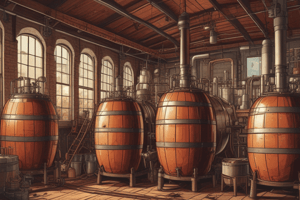Podcast
Questions and Answers
Which of the following are the four generic whiskey rules? (Select all that apply)
Which of the following are the four generic whiskey rules? (Select all that apply)
- Made from 100% fermented grain (correct)
- Distilled above 190 proof
- Bottle at a minimum of 80 proof (correct)
- Put into an oak container (correct)
What are the six bourbon rules? (Select all that apply)
What are the six bourbon rules? (Select all that apply)
- Aged for a minimum of 5 years
- At least 51% corn (correct)
- Produced in the USA (correct)
- Contains no added substances other than water (correct)
What is Kentucky Bourbon required to meet?
What is Kentucky Bourbon required to meet?
Must be produced and aged for at least one year in the state of Kentucky.
What is straight bourbon?
What is straight bourbon?
Which of the following are the five Irish whiskey rules? (Select all that apply)
Which of the following are the five Irish whiskey rules? (Select all that apply)
What characterizes Malt Irish Whiskey?
What characterizes Malt Irish Whiskey?
What defines Pot Still Irish Whiskey?
What defines Pot Still Irish Whiskey?
What are the six Scotch whisky rules? (Select all that apply)
What are the six Scotch whisky rules? (Select all that apply)
What is single malt Scotch whisky?
What is single malt Scotch whisky?
What are the three Canadian whisky rules? (Select all that apply)
What are the three Canadian whisky rules? (Select all that apply)
What is proof?
What is proof?
A bold, spicy bourbon most likely uses which flavoring grain? ______
A bold, spicy bourbon most likely uses which flavoring grain? ______
What is the minimum age requirement for a bourbon?
What is the minimum age requirement for a bourbon?
What adds nutrients to the water used in Kentucky for distilling?
What adds nutrients to the water used in Kentucky for distilling?
Flashcards are hidden until you start studying
Study Notes
Whiskey Guidelines
- Generic whiskey must be made from 100% fermented grain, distilled below 190 proof, aged in an oak container, and bottled at a minimum of 80 proof.
- Bourbon requires a USA origin, at least 51% corn, distilled at 160 proof or below, aged in a new charred oak container, put into the barrel at 125 proof or below, and contains no additives except water.
Specific Types of Whiskey
- Kentucky Bourbon must be produced and aged for at least one year in Kentucky.
- Straight Bourbon must be aged for a minimum of 2 years; if under 4 years, an age statement is required.
Irish Whiskey Standards
- Irish whiskey must be produced in Ireland, made from cereal grains, fermented by yeast, distilled to a maximum of 189.6 proof, and aged in wooden casks in Ireland for at least 3 years.
- Malt Irish Whiskey consists of only water and malted barley from a single distillery.
- Pot Still Irish Whiskey contains both malted and unmalted barley, distilled in a pot still.
- Grain Irish Whiskey uses continuous distillation and unmalted grains.
- Blended Irish Whiskey is a mix of pot still and column still whiskeys.
Scotch Whisky Regulations
- Scotch whisky must be made in Scotland from malted barley, using natural enzymes, aged for at least 3 years in oak casks no larger than 700 liters, and may contain caramel coloring.
- Single Malt Scotch Whisky is produced at a single distillery using only water and malted barley.
- Single Grain Scotch Whisky includes multiple grains and refers to coming from a single distillery, not to one type of grain.
- Blended Malt Scotch combines single malt whiskies from different distilleries.
- Blended Grain Scotch is a mix of single grain whiskies from various distilleries.
- Blended Scotch includes both single malt and single grain whiskies.
Canadian Whisky and Tennessee Whiskey
- Canadian whisky must be produced in Canada, made from cereal grains, and aged in wooden barrels for at least three years.
- Tennessee whiskey requires a minimum of 51% corn, distilled at 160 proof or below, charcoal filtered, and aged in new charred oak barrels.
General Whiskey Production Terms
- Alcohol by Volume (ABV) indicates the percentage of alcohol in a solution.
- Batch distillation involves making a spirit one batch at a time using pot stills, whereas continuous distillation uses column stills for ongoing production.
- Caramel coloring is a common food coloring agent.
- Mash Bill is the grain recipe used in distillation.
Distillation and Fermentation Processes
- Malt refers to grains that have begun to sprout and are then dried.
- Yeast converts sugar into alcohol and carbon dioxide during fermentation.
- Sour Mash incorporates liquid stillage from a previous batch into the next, while Sweet Mash uses only fresh water.
- Starch is a glucose chain that converts into sugar during fermentation.
Barrels and Aging
- Standard barrel size for aging bourbon is 53 gallons.
- Angel's Share refers to alcohol that evaporates from barrels during aging.
- Barrel aging is the process through which whiskey develops flavors and color.
- Charring and toasting are methods used to treat the inside of barrels, influencing flavor.
- Rick House is where barrels are stored during aging.
Additional Terms
- Bottled In Bond bourbon is produced at one distillery in one season, aged for at least four years, and bottled at exactly 100 proof.
- Secondary maturation involves transferring bourbon to a new barrel for additional aging.
- TTB refers to the Alcohol and Tobacco Tax and Trade Bureau, which regulates alcohol production and distribution.
Studying That Suits You
Use AI to generate personalized quizzes and flashcards to suit your learning preferences.





